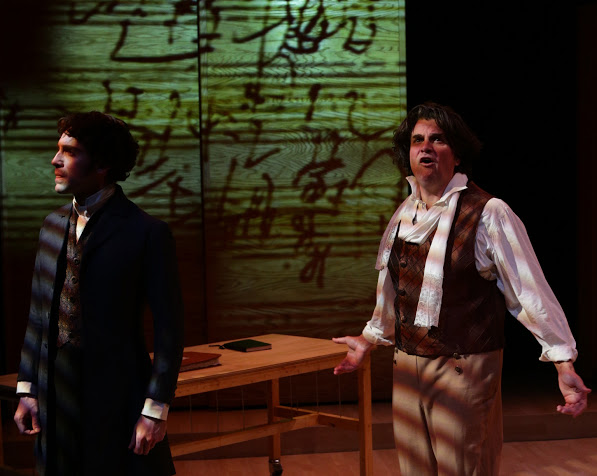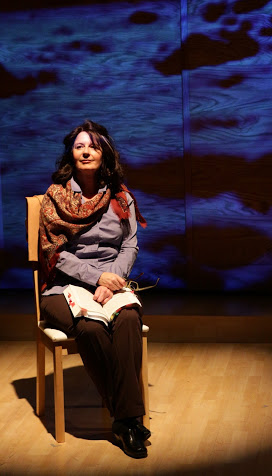Theater Review: A Compelling “33 Variations”
The Lyric Stage actors and pianist Catherine Stornetta do an excellent job making all of 33 Variations intelligible and, sometimes, very funny.
33 Variations by Moisés Kaufman. Directed by Spiro Veloudos. Scenic Design by Cristina Todesco. Costume Design by Charles Schoonmaker. Lighting Design by Karen Perlow. Sound Design by Brendan Doyle. Presented by the Lyric Stage Company of Boston. At Lyric Stage, 140 Clarendon Street, Boston, MA, through February 2.
By Helen Epstein
It was difficult, watching the Lyric Stage Company’s New England premiere of 33 Variations, to focus on Moisés Kaufman’s exploration of life, death, and the creative process without hearing echoes of Peter Schaffer’s Amadeus and Margaret Edson’s Wit. Those plays, with their clearly etched and ailing protagonists, became “modern” classics well before Kaufman wrote his script. I admired the clarity of his Laramie Project and Gross Indecency: The Three Trials of Oscar Wilde but, though his 33 Variations are entertaining, I left wondering whether there was any fresh meat in the pastiche.
Much like Amadeus, the costume drama that contrasts the musical genius Amadeus Mozart with his less gifted colleague Antonio Salieri, 33 Variations pairs Ludwig von Beethoven with the nineteenth-century, Viennese music publisher Anton Diabelli. He’s a decent man but a mediocre composer who has composed a theme and, like Salieri, asks a master to write a variation on it. Instead of composing the single variation as requested, Beethoven slowly becomes obsessed with mining the work for more and eventually writes over 30. As the play unfolds, the composer bargains with Diabelli, produces more variations, bullies his servant Schindler, struggles with poverty, and tries to come to terms with his growing deafness.
Wit begins with Dr. Vivian Bearing, a brilliant professor of metaphysical poetry, receiving a diagnosis of ovarian cancer. 33 Variations begins with Dr. Katherine Brandt, a brilliant musicologist, receiving a diagnosis of ALS. Both plays track an intensely intellectual woman grappling with an incurable disease. Unlike the childless Dr. Bearing, the equally chilly Dr. Brandt has an adult daughter who falls into a relationship with her mother’s male nurse. Both women develop a kind of friendship with a German archivist in Bonn’s Beethoven-Haus, where Dr. Brandt flies to study Beethoven’s original scores.
It’s a lot to pack in—ruminations on the artistic process and the scholars who try to understand art and artist; obsession; varieties of love; a difficult mother-daughter relationship; a simpler master-servant relationship; the depradations of illness; the complexity of the solo piano music itself. The actors and pianist Catherine Stornetta do an excellent job making all of 33 Variations intelligible and, sometimes, very funny.

Victor L. Shopov and James Andreassi in the Lyric Stage Company’s production of 33 VARIATIONS. Photo: Mark S. Howard.
The vibrant and versatile Paula Plum gives a virtuoso performance as an impassioned academic, flawed mother, and ALS patient, whose downward spiral from cane to walker to wheelchair is as moving as it is inexorable. Newcomer Dakota Shepard is engaging as her neglected daughter Clara. So is Kelby T. Akin, as her dopey male nurse, and Will McGarrahan, as a dignified and persuasive Anton Diabelli.
The actors playing Beethoven, Schindler, and archivist Dr. Gertrude Ladenburger are less persuasive. Maureen Keiller’s accent ebbed and flowed, and she often veered toward a caricature of a German female. Though costumed in period clothing and sporting a thick mane of hair, James Andreassi seemed more of a Beethoven impersonator than an image of the composer. Victor L. Shopov was colorless as his servant.
Kaufman gives us so many relationships and themes to follow during the two hours and 15 minutes of 33 Variations that I was never bored. I was, however, struck by the cramped and crowded performance space, made even smaller than it is by director Spiro Veloudos’s decision to feature a baby grand near center-stage. He directs so expertly that the performers are able to avoid collisions as they move around and about, but the tiny set made me think of a boxed-in diorama rather than a succession of hospital and hotel rooms, the Beethoven archive, a forest, an airplane, Beethoven’s home, and the subway. Realistic, projected visuals provide the backdrops: Sometimes they work; Sometimes they didn’t. I wished for a more abstract set and lighting design—as well as a performing space with additional elbow room. Still, I was glad to have seen 33 Variations and applaud the Lyric Stage for tackling such an ambitious play.
Helen Epstein is the author of Joe Papp: An American Life, Music Talks, and other books about the performing arts. She has written both memoir and biography and publishes classics of the genres at e-publisher Plunkett Lake Press.


We loved 33 Variations. Funny, poignant, brilliant, in a gem of a production. The variations are both Beethoven’s obsession and the intersections of lives and passions and relationships across a couple of centuries…. It is beautifully staged, with many wonderful moments!!! I thought all of the characters were strong, and compelling, and hope to go again!!